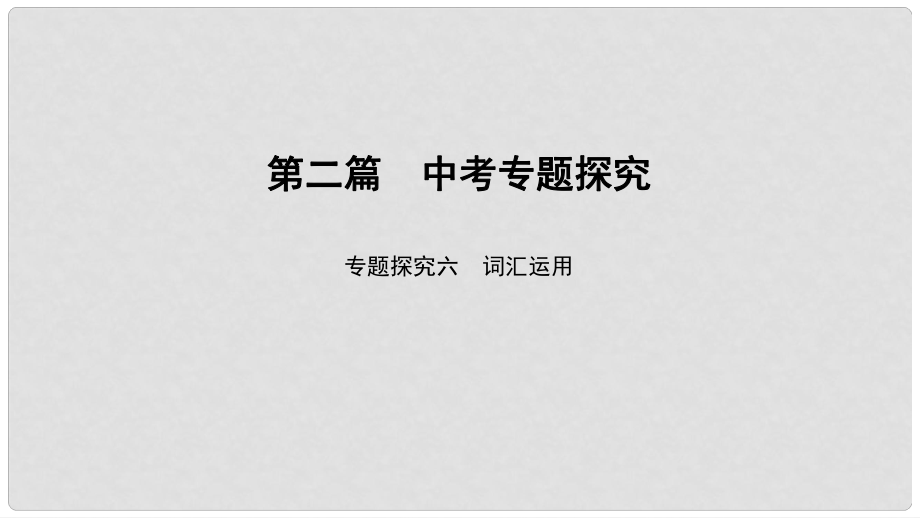《中考英語總復(fù)習(xí) 第2篇 中考專題探究 專題探究6 詞匯運(yùn)用課件 人教新目標(biāo)版》由會(huì)員分享����,可在線閱讀,更多相關(guān)《中考英語總復(fù)習(xí) 第2篇 中考專題探究 專題探究6 詞匯運(yùn)用課件 人教新目標(biāo)版(15頁珍藏版)》請?jiān)谘b配圖網(wǎng)上搜索���。
1����、第二篇中考專題探究第二篇中考專題探究專題探究六詞匯運(yùn)用 A語篇填空閱讀短文���。根據(jù)其內(nèi)容���。在方框中選擇恰當(dāng)?shù)膯卧~或詞組。以正確形式填空���。使文章正確�����、通順���。 命題導(dǎo)向: 中考英語試題為遵循“突出語篇�����,強(qiáng)調(diào)應(yīng)用���,注重實(shí)際”的命題原則。在注重考查基礎(chǔ)語言知識的同時(shí)���,突出語境因素的考查��,讓考生在特定的情境中體現(xiàn)語言的運(yùn)用能力�����,是近年來中考英語測試的趨勢���,測試重點(diǎn)逐漸放在語篇理解的層面上,這種在考查基礎(chǔ)知識的同時(shí)側(cè)重考查能力和以篇章理解為中心的試題���,能更加科學(xué)���、更加全面地測試學(xué)生的英語水平,對英語教學(xué)導(dǎo)向具有積極意義和創(chuàng)新突破。這種題型考查的是考生的整體閱讀能力����、基礎(chǔ)語法的運(yùn)用能力和書面表述能力��,雖然綜合
2�����、性較強(qiáng)���,但由于提供了所填單詞��,一定程度上減輕了難度����,適合初中生的能力程度���。1 解題技巧: 1認(rèn)真審題�,掌握整篇文章大意���; 2根據(jù)語境����,靈活運(yùn)用語法規(guī)則、固定搭配�����、習(xí)慣用語等進(jìn)行分析����、正確選詞填寫; 3全文整體分析�����、推敲����,確保所填寫部分的正確性; 4此題要求學(xué)生基礎(chǔ)扎實(shí)�����,嚴(yán)謹(jǐn)認(rèn)真��。 實(shí)戰(zhàn)演練2advantagesto discussencouragedbravely3advicerelaxedmyselfstudyingclassmatesconfidence4first started which miss walked was again somebody bus stop quickly
3�、5improving watchinglistening6 This is a great way to learn English! Talk about the film or song with your friends, and guess the 4._ of the new words. Just enjoy yourself! The second question is about 5. _. Sam, from Suzhou wrote,“Our school has a foreign teacher. But Im shy and cant speak to her. W
4、hat should I do���?” When I visit China, lots of people in the street say, “Hello! How are you? Where are you from? Do you like China�?” These are good questions 6. _a conversation. Many people are shy when they speak English, so before you begin, take a deep breath and smile�!7. _ always helps. The 8. _
5����、 question is about vocabulary. Oliver, from Anhui Province wrote,“I want 9. _all the new words.meaningspeakingto startSmiling/smilethirdto remember7 I write them down, but I forget them quickly. What should I do�?” Try to remember eight or ten words a day. Write them on pieces of paper and place them
6、 in your bedroom. Say the words when you see them, and change them every day. And when youre shopping, how about counting the English words��,or 10._ the English names for everything you see?saying8 B根據(jù)句意�����,用所給單詞的正確形式填空 命題導(dǎo)向:它主要通過學(xué)生應(yīng)具備的詞匯�、構(gòu)詞法及語法知識,設(shè)置一定語境考查學(xué)生的語言運(yùn)用能力����,并以此來測試學(xué)生對句意、語境的理解�����,具有一定的綜合性和靈活性。 解題技巧:
7��、1認(rèn)真審題�,掌握所缺部分在整個(gè)句子中的作用; 2根據(jù)語境�����,靈活運(yùn)用語法規(guī)則���、固定搭配�����、習(xí)慣用語等進(jìn)行分析����、正確填寫�����; 3全句整體分析���、推敲����,確保所填寫部分的正確性; 4此題是學(xué)生考試當(dāng)中錯(cuò)誤率較高的題目�����,要求學(xué)生基礎(chǔ)扎實(shí)�,嚴(yán)謹(jǐn)認(rèn)真����。 實(shí)戰(zhàn)演練9 .用所給單詞的正確形式填空。 1Mr Zhang _(teach)us English three years ago. 解析:根據(jù)時(shí)間狀語three years ago可知�����,要用一般過去時(shí)��。 2Peter turned off the computer after he finished _ (write) an e-mail. 解析:根據(jù)finis
8����、h doing sth.可知。 3Mr Green has been to the South _ (two) 解析:根據(jù)句意可知���。 4Mr Liu isnt here now.He _ (go)to Beijing. 解析:根據(jù)“Mr Liu isnt here now”可知他去北京了還沒回來�。 5The children will go to the zoo if it _ (not rain) this Saturday. 解析:if引導(dǎo)的條件狀語從句主句是將來時(shí),從句動(dòng)詞用一般現(xiàn)在時(shí)表示將來�����。taughtwritingtwicehas gonedoesnt rain10 6There
9���、_(be) a meeting in our school tomorrow afternoon. 解析:根據(jù)時(shí)間狀語tomorrow afternoon可知用一般將來時(shí)����。 7More and more people all over the country are worried about food _(safe) 解析:safe 是形容詞�����,safety 是名詞形式���。 8Youd better _(eat)less food before you go to bed. 解析:由“had better動(dòng)詞原形”可知�����。 9My teacher told me that light _(trav
10���、el)much faster than sound. 解析:在賓語從句中����,當(dāng)表示客觀真理時(shí)���,動(dòng)詞用一般現(xiàn)在時(shí)��。 10The girl was not born in _ (German) 解析:German 是形容詞����,Germany 是名詞“德國”��。will/ is going to besafetyeattravelsGermany11 .根據(jù)句意�����,用所給單詞的正確形式填空����。 11I found my father still _(wake) when I entered his room at 11 last night. 12. The first computers were buil
11���、t in the 1940s. They were even_ (big) than cars. 13. What should we do to help the_(home) people after the earthquake? 14. I got a new bicycle from my father on my_ (sixteen)birthday. I like it very much. 15. Jiuzhaigou is an area of natural_(beautiful). It attracts lots of tourists every year.awake
12�����、 bigger homeless sixteenth/16th beauty 12 16. Wearing a smile on your face not only helps you make friends but also makes you_ (feel) better. 17Edison had over two thousand_(invent) in his life. 18English_(teach) in our class by Mr Green last term. 19How high these _(build) are! 20England and France are both_(Europe) countries.inventions feelwas taught buildings European 13
 中考英語總復(fù)習(xí) 第2篇 中考專題探究 專題探究6 詞匯運(yùn)用課件 人教新目標(biāo)版
中考英語總復(fù)習(xí) 第2篇 中考專題探究 專題探究6 詞匯運(yùn)用課件 人教新目標(biāo)版

